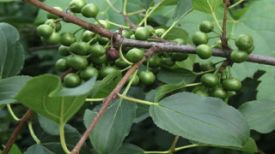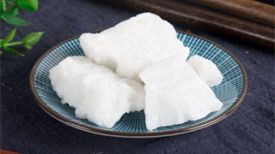Drug name: Guizhi
Source: "Tang Bencao"
Classification: Antitumor drugs
Origin: Guangxi, Guangdong, Yunnan and other regions
Taste: Warm in nature, spicy and sweet in taste
Meridian: Meridian of the lungs, heart, and bladder
Effect: Sweating and muscle relieving, warming and unblocking meridians, assisting in the transformation of yang and qi
Indications: Wind cold cold, chest pain, epigastric pain, blood cold amenorrhea, joint pain, phlegm and fluid, edema, palpitations, and running dolphin
Character identification: This product is cylindrical in shape, with many branches, 30-75cm in length, and 0.3-1cm in diameter at the coarse end. The surface is reddish brown to brown, with longitudinal ridges, fine wrinkles, and small nodular leaf marks, branch marks, and bud marks, with punctate pores. Hard and brittle, easily broken, with a slice thickness of 2-4mm. The skin of the cross-section is reddish brown, and the wood is yellow white to light yellow brown. The pulp is slightly square. Has a unique aroma, sweet and slightly spicy taste, with a strong skin flavor.
Usage&Taboos for Internal Administration: Decoction, 3-9g. Taboos: Those with high fever, yin deficiency and excessive fire, and those with excessive blood and heat should not take it.
Chemical composition: This product contains volatile oil, mainly composed of cinnamaldehyde, as well as phenols, organic acids, polysaccharides, glycosides, coumarin, and tannins.
Pharmacological effects: Guizhi decoction and cinnamaldehyde have cooling and antipyretic effects. Guizhi decoction and ethanol extract have inhibitory effects on Staphylococcus aureus, Staphylococcus aureus, Salmonella typhi, common pathogenic skin fungi, Shigella dysentery, Salmonella enteritidis, Vibrio cholerae, influenza virus, etc. Cinnamon oil and cinnamaldehyde have inhibitory effects on Mycobacterium tuberculosis. Cinnamon oil has effects such as strengthening the stomach, relieving gastrointestinal spasms, diuresis, and strengthening the heart. Cinnamaldehyde has analgesic, sedative, and anticonvulsant effects; Volatile oil has cough relieving and expectorant effects.
Chinese herbal formula
1. To treat heart distension, various rebellions, and heart pain: three liang each of osmanthus twig and ginger, and five pieces of Fructus Aurantii. Take three flavors, six liters of water, boil three liters, and take three servings at different temperatures. (Gui Zhi Sheng Jiang Zhi Shi Tang in "Jin Kui Yao Lue")
2. To treat blood stasis, both yin and yang are slight, with the inch mouth closed slightly and the ruler small and tight. The external symptoms of the body are not benevolent, like wind obstruction: three liang of Huangqi, three liang of Shaoyao, three liang of Guizhi, six liang of ginger, and twelve jujubes. Take six liters of water from the top five flavors, boil two liters, warm for seven times, and three times a day. (Huangqi Guizhi Wuwu Tang)
According to ancient texts, the "Classic of Materia Medica" states that it effectively dispels evil. Beneficial for liver and lung qi, headache, wind and joint pain. "Compendium of Materia Medica": Cinnamomum twig is a medicine that dispels wind and cold, dispels external evil, produces evil sweat, stops coughing, and removes wind pain in limbs and joints. The odor may not be separated from the pungent heat, but it belongs to the branches and can only diverge between the skin, hair, muscle, and skin, and the joints of the arms, knees, and limbs.
Traditional Chinese Medicine - Guizhi
Release time:2024-06-04 15:18:46
Reading:210
Word Count:3462
Subscribe to email
▣ Recommendation


